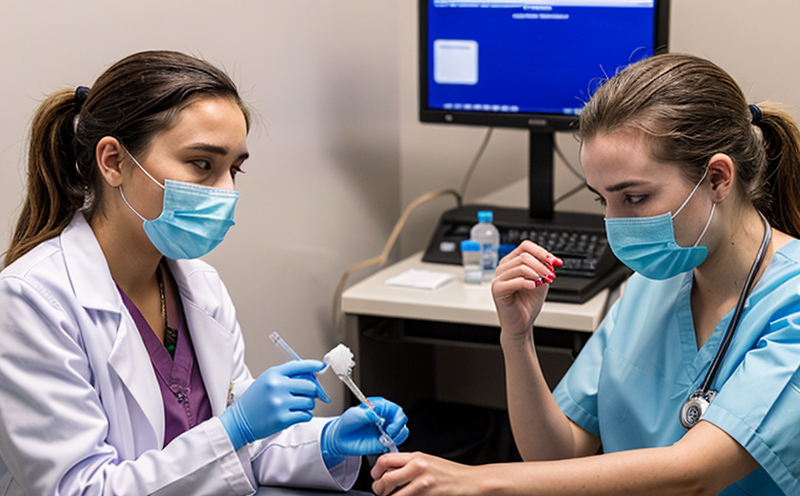ISO 11737 Sterility Testing of Medical Products
The ISO 11737 standard is a cornerstone in ensuring the sterility and safety of medical devices, particularly those intended for use by immunocompromised patients or patients with open wounds. This internationally recognized standard mandates rigorous testing to ensure that no viable microorganisms are present on or within the product.
The sterility test evaluates whether a medical device is free from living pathogenic microorganisms under specified conditions. This process involves inoculating a sample of the device into a suitable culture medium and incubating it for an appropriate period, typically 14 days at 35°C ± 2°C. If no growth is observed during this time, the test is considered positive, indicating sterility.
The ISO 11737-10 series of standards covers various aspects including sampling, preparation, and testing methods for different types of medical devices. For instance, ISO 11737-10 specifies the sampling strategy to ensure that a representative sample is tested. Proper sampling is crucial as it directly influences the accuracy of the sterility test results.
Sampling must be conducted in a controlled environment following strict protocols to avoid contamination. Once collected, samples are processed using methods outlined by ISO 11737-20, which might include dilution techniques or direct plating onto selective media. The choice of culture medium and incubation conditions is critical as it affects the detection capability for different types of microorganisms.
Understanding the test parameters is essential for ensuring compliance with ISO standards. For instance, the type of medical device (e.g., intravenous catheters, surgical instruments) influences the sampling strategy and the expected outcome based on its intended use. The testing process also requires specific equipment such as laminar flow cabinets to minimize contamination risks.
The importance of sterility cannot be overstated in healthcare settings. Contaminated medical devices can lead to severe infections and even fatalities, especially in immunocompromised patients or those undergoing surgery. Sterility testing is thus a mandatory step before any medical device enters the market or is used in clinical practice.
Real-world applications of ISO 11737 sterility testing include ensuring that implantable devices like pacemakers and joint replacements do not harbor bacteria, preventing post-surgical infections. Similarly, for surgical instruments, ensuring sterility minimizes the risk of cross-contamination between patients in hospitals.
- Sampling Strategy: Follows ISO 11737-10 guidelines to ensure a representative sample is tested.
- Culture Medium: Selective media suitable for the expected type of microorganism, as per ISO 11737-20 recommendations.
- Inoculation: Inoculating the device into culture medium under aseptic conditions to avoid contamination.
- Incubation: Incubating at 35°C ± 2°C for 14 days to allow growth of any present microorganisms if they were not killed during sterilization.
The testing process is highly sensitive and must be conducted in an environment that minimizes the risk of contamination. Proper training of personnel involved in sampling, processing, and testing ensures adherence to these stringent requirements.
Benefits
Sterility testing under ISO standards is crucial for ensuring patient safety and compliance with regulatory requirements. Here are some key benefits:
- Patient Safety: Ensures that medical devices do not introduce pathogens into the patient, reducing the risk of infections.
- Regulatory Compliance: Meeting ISO 11737 ensures compliance with international standards and facilitates market entry.
- Risk Management: Identifies potential contamination issues early in the product lifecycle, allowing for corrective actions before devices reach the market.
- Quality Assurance: Provides a standardized method to assess the quality of sterilization processes used in manufacturing medical devices.
The benefits extend beyond compliance and safety. Implementing ISO 11737 also enhances brand reputation by demonstrating a commitment to high standards and patient well-being.
Eurolab Advantages
At Eurolab, we pride ourselves on providing comprehensive sterility testing services that meet the highest international standards. Our advantages include:
- Expertise: Skilled professionals with extensive experience in medical device testing.
- State-of-the-Art Facilities: Equipped laboratories designed to minimize contamination risks and ensure accurate results.
- Sophisticated Equipment: High-tech instrumentation for precise sampling, processing, and testing.
- Comprehensive Reporting: Detailed reports that provide insights into the sterility of medical devices.
We offer a range of services tailored to meet your specific needs, including custom testing protocols. Our commitment to quality ensures that our clients receive reliable and accurate results every time.





